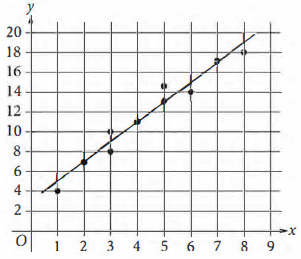Question
What is 120% of 2,000?
- 240
- 400
- 2,400
- 4,000
The correct answer is: 2,400
120% of 2000
 .
.
Related Questions to study

Ten data points are in the scatterplot shown, along with a line of best fit. Which of the following best estimates the predicted value of y when x = 6.5 ?

Ten data points are in the scatterplot shown, along with a line of best fit. Which of the following best estimates the predicted value of y when x = 6.5 ?
If s = 4, what is the value of 20s - 15s ?
If s = 4, what is the value of 20s - 15s ?
A square is inscribed in a circle with radius 6 inches. What is the perimeter of the square in inches?
inches. What is the perimeter of the square in inches?
A square's perimeter is the sum of the lengths of its four sides. As a result, we can calculate a square's perimeter by adding its four sides together. Each side of a square has the same length. Therefore, the side of a square is added four times to determine the perimeter of square.
Each side of a square with a 9-square-inch area is 3 inches long. Therefore, 3 inches multiplied by 3 inches equals 9 inches. (Length times height is a square's surface area formula.) A square has four sides; therefore, multiplying '3' by '4' gives us the perimeter, which is 12 inches.
A square is inscribed in a circle with radius 6 inches. What is the perimeter of the square in inches?
inches. What is the perimeter of the square in inches?
A square's perimeter is the sum of the lengths of its four sides. As a result, we can calculate a square's perimeter by adding its four sides together. Each side of a square has the same length. Therefore, the side of a square is added four times to determine the perimeter of square.
Each side of a square with a 9-square-inch area is 3 inches long. Therefore, 3 inches multiplied by 3 inches equals 9 inches. (Length times height is a square's surface area formula.) A square has four sides; therefore, multiplying '3' by '4' gives us the perimeter, which is 12 inches.



